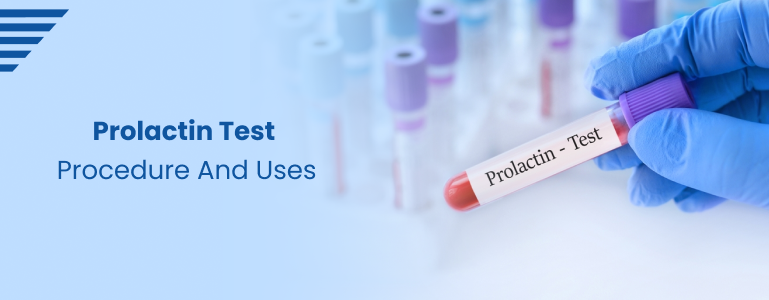Prolactin Test Procedure and Uses

The prolactin test, also known as a serum prolactin test, is crucial in diagnosing and monitoring various health conditions, particularly those related to hormonal imbalances and reproductive health. In this blog, we will provide a comprehensive guide on the prolactin test, including its procedure, its common uses, and why it's an essential tool in healthcare.
What is a Prolactin Test?
A prolactin test measures the prolactin levels, a hormone produced by the pituitary gland, in the blood. Prolactin is vital in various physiological functions related to breastfeeding and reproductive health.
Home Sample Collection
Procedure for the Prolactin Test
The prolactin test is a straightforward procedure:
Blood Collection: A healthcare professional will draw a blood sample from a vein, typically in your arm. The model is then sent to a laboratory for analysis.
Timing: Timing is crucial for accurate results. Prolactin levels can vary throughout the day, so the test is often performed in the morning when levels are usually higher.
Patient Preparation: Sometimes, you may be asked to fast for a few hours before the test. Your healthcare provider will provide specific instructions.
Common Uses of the Prolactin Test
The prolactin test is used for various medical purposes:
Evaluating Fertility Issues: High prolactin levels can interfere with ovulation and menstrual cycles, potentially causing infertility. The test helps diagnose and manage these issues.
Assessing Pituitary Function: Abnormal prolactin levels may indicate a pituitary gland disorder, such as a tumour (prolactinoma). The test helps in the diagnosis and monitoring of such conditions.
Investigating Breast Health: Prolactin levels may be assessed when studying breast-related concerns, such as abnormal milk production (galactorrhea) unrelated to breastfeeding.
Monitoring Medications: Some medications can affect prolactin levels. This test helps monitor these effects and ensures patient safety.
Diagnosing Amenorrhea and Irregular Periods: High prolactin levels can lead to amenorrhea (absence of menstruation) or irregular menstrual periods—the test aids in diagnosing these conditions.
Assessing Hyperprolactinemia: Elevated prolactin levels, known as hyperprolactinemia, can cause various symptoms, including breast tenderness, headaches, and vision changes. The test helps diagnose this condition and guides treatment.
Importance of the Prolactin Test
The prolactin test is crucial for several reasons:
Early Diagnosis: It allows for the early diagnosis and treatment of underlying conditions affecting fertility, reproductive health, and overall well-being.
Treatment Guidance: For conditions like prolactinomas, monitoring prolactin levels helps healthcare providers determine the effectiveness of treatment, such as medication or surgery.
Management of Symptoms: Elevated prolactin levels can cause distressing symptoms. The test aids in identifying the root cause and developing an appropriate treatment plan.
Fertility Planning: For individuals planning to start a family, the prolactin test can provide valuable insights into potential fertility issues.
Conclusion
The prolactin test is a valuable diagnostic tool for assessing hormonal imbalances, reproductive health, and pituitary gland function. Whether you're experiencing fertility issues, irregular menstrual cycles, or other symptoms related to prolactin levels, this test can provide essential information for diagnosis and treatment planning. If you have concerns about your hormonal health or plan to conceive, consider discussing the prolactin test with your healthcare provider to ensure the best possible care and outcomes.
Frequently Asked Questions
What is a Prolactin Test, and why is it performed?
A Prolactin Test measures the levels of the hormone prolactin in the blood. It is performed to diagnose and monitor various health conditions related to hormonal imbalances and reproductive health.
How is the Prolactin Test conducted?
The test involves drawing a blood sample from a vein, usually in the arm. Timing and patient preparation may be necessary for accurate results.
When should I consider getting a Prolactin Test?
You should consider this test if you have concerns about fertility, irregular menstrual cycles, abnormal breast-related symptoms, or other issues related to hormonal balance.
What can high levels of prolactin indicate?
Elevated prolactin levels can indicate conditions like pituitary gland disorders, tumours (such as prolactinomas), and other underlying health issues that may affect fertility and reproductive health.
Can the Prolactin Test help diagnose fertility problems?
The test can help identify hormonal imbalances contributing to fertility issues, allowing for early diagnosis and appropriate treatment.
Are there specific preparations required before taking the Prolactin Test?
Depending on your healthcare provider's instructions, you may be asked to fast for a few hours before the test. Timing, as well as specific preparation, may vary.
Can medications affect prolactin levels?
Yes, certain medications can influence prolactin levels. Your healthcare provider may monitor these levels to assess the impact of drugs on your hormonal balance.
Are there any side effects or risks associated with the Prolactin Test?
The test is generally safe, with minimal risks associated with blood collection. Some people may experience minor discomfort or bruising at the needle insertion site.
How often should I have my prolactin levels checked?
The frequency of testing depends on your specific medical situation. Your healthcare provider will determine how often you need to monitor your prolactin levels.
Can elevated prolactin levels be treated?
Yes, depending on the underlying cause, elevated prolactin levels can often be managed effectively with medication or, in some cases, surgery.
Book Your Slot
Our Locations Near You in Hyderabad
3KM from Banjara Hills
1.9KM from Yusufguda
3KM from Madhura Nagar
5KM from Shaikpet
Profiles
- Cardiac Risk Profile
- Pituitary marker Profile
- Rheumatoid Arthritis Profile
- Dengue Fever Panel
- Lung Cancer Panel 1 Complete Molecular
- Gastroenteritis Screening Panel
- Thyroid Profile (T3,T4,TSH), Serum
- Pancreatic Marker Profile
- STD profile
- Androgen Profile
- Lipid Profile, Serum
- Pancreatic(acute)Profile
- PCOD Profile
Radiology
Pathology Tests
- Glucose Fasting (FBS),Sodium Fluoride Plasma
- Creatinine, Serum
- Glycosylated Hemoglobin (HbA1C)
- Vitamin B12 (Cyanocobalamin), Serum
- Thyroid Stimulating Hormone (TSH) Ultrasensitive, Serum
- Complete Urine Examination (CUE), Urine
- Liver Function Test (LFT),Serum
- Dengue (IgG & IgM), Serum
- Dengue Antigen (Ns1) Rapid, Serum
- C-Reactive Protein (CRP), Serum
- Widal (Slide Method), Serum
- Total IgE, Serum




